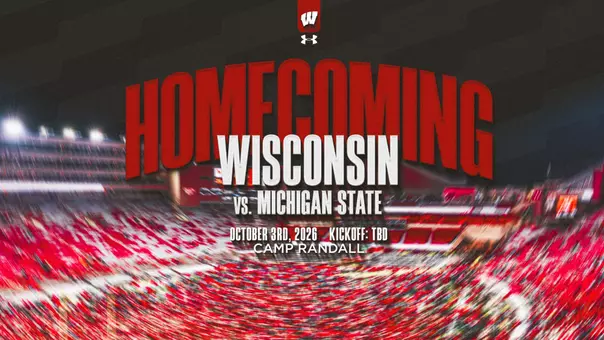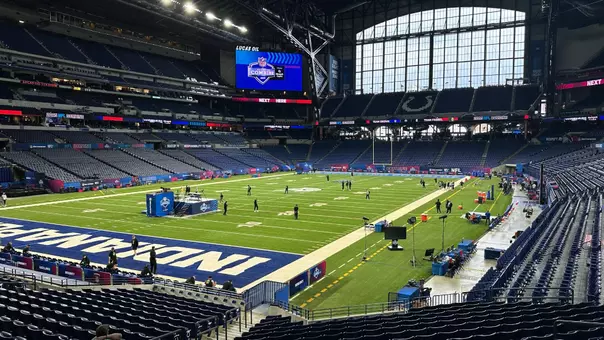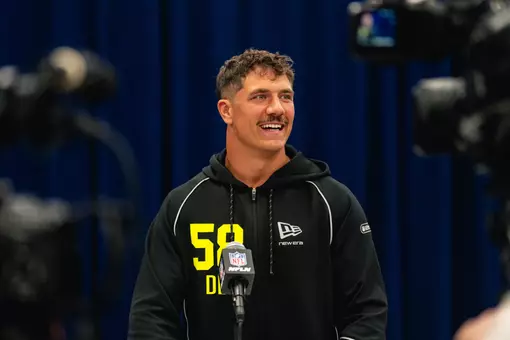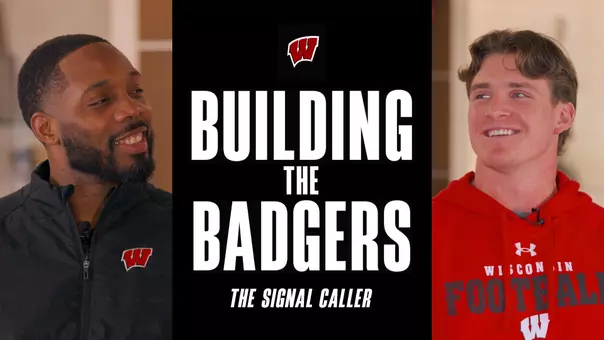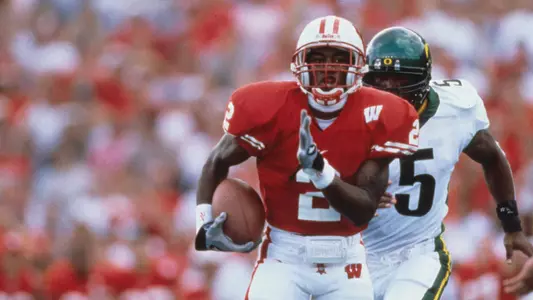
Dream Season ‘Where are they Now?’: Jamar (Fletcher) Israel
October 06, 2020 | Football, Mike Lucas
After NFL, former Badger transformed both his name and life beyond football
 |
|
|
BY MIKE LUCAS
UWBadgers.com Senior Writer
***Be sure to check out this week's Dream Season game, Wisconsin vs. Michigan from Sept. 21, 2019, on Saturday, Oct. 10 starting at 5 p.m. CT on BTN's YouTube channel.***
MADISON, Wis. — It was about seven years ago that Jamar Fletcher, the former Wisconsin All-American cornerback, decided to "pay homage to my Maker" by changing his surname to Israel; a faith-based choice that was at "the center of my thoughts and who I am."
It was a life-altering moment in the wake of an on-field legacy of game-changing ones.
After playing eight seasons in the National Football League for five organizations (Miami, San Diego, Detroit, Houston and Cincinnati) — the Dolphins selected him in the first round of the 2001 draft — he walked away from the sport with no complaints in late August of 2009 shortly after turning 30.
"I told people when I was six and seven years old that I was going to play in the NFL — I could see myself there — and that happened," said Israel, 41, a St. Louis native. "I got out with my health and my right mind about me. And I was able to help my family and help myself.
"But I knew there were other things on the agenda for me.
![]() "As much as I loved football, I've always known that I was here for more than football."
"As much as I loved football, I've always known that I was here for more than football."
These days, Israel has funneled his energy into his business enterprises revolving around private equity, the food and beverage industry and real estate investment and development. While building custom homes in Tennessee, his primary residence is in Florida, the Hollywood/Fort Lauderdale area.
"I loved football and it was obviously an integral part of my life," he reiterated. "But I've always had ideas and interests in other things also. What I'm doing now is a lot of what I've always wanted to do. I'm learning and doing new things. There are new avenues and new worlds. That's exciting to me."
Coaching was never a career path that he seriously considered despite his natural instincts for the game and a high football IQ that he exhibited as a ball-hawking, lockdown corner who was a two-time first team All-American and the 2000 Big Ten Defensive Player of the Year.
"I've spoken to young athletes every so often from high school on up — to guys going to the pros or guys in the pros," he said. "Coaching is cool. All good. But I'd rather talk to these young guys about how to handle themselves off the field and how to do certain things to make sure they're successful.
"You've got a million people out there telling athletes how to run, throw, and catch. But where are they when the young man needs some guidance in terms of his financials? Or his mindset? My thing has always been, if a guy runs a 4.1 but he has a 1.4 grade-point average, what good is that?"

You could make a strong argument for Israel being the greatest defensive back in school history — Troy Vincent and Jim Leonhard would be in that discussion — since he's the only Badger to ever win the Jim Thorpe Award that goes to the top DB in the nation. But he was not a lock for such success.
"Nobody bet on me to make it like that," he said. "You're talking about a guy who wasn't the biggest or the fastest. I was really overlooked more than anything. I had confidence. But a lot of people wouldn't have picked me out of other athletes to say, 'This is the guy that is going on to the pros.'
"I didn't come from one of those football hot beds. We have a lot of great athletes in St. Louis, don't get me wrong. But I didn't come from a Florida or a Texas or a California where you got all those scouts going through there and you've got a million players.
"I came from St. Louis where it's a different ballgame.
"To make it out of that situation, I call it a victory."
Football was not even his best sport.
"Most people who really know me would say that baseball was my best," Fletcher suggested. "I played all around the diamond, predominantly shortstop and pitcher coming up (the youth ranks).
"But the thing is, baseball was probably my least favorite sport. It was not as exciting as football or basketball. By the time I got to high school (Hazelwood East), I didn't have the love for baseball. But I always had a passion for football and it just so happed to work out."
Not long after Phil Elmassian reported to work on the third weekend of January in 1997 — his first day on the job as Wisconsin's new secondary coach — he was handed four videos of high school defensive backs. Pick one. The Badgers had offered scholarships to all four. They only had room for one.
After evaluating the tapes, he recommended Israel to head coach Barry Alvarez.
"They believed in me," Israel said of Elmassian and defensive coordinator Kevin Cosgrove, who were the principle recruiters. "And they were genuine when they said, 'We know you can play ball.' It wasn't about, 'You're not this big or you're not this fast.' I will always be thankful to those guys."
Israel rewarded their confidence with 21 career interceptions (Leonhard would later forge into a tie with him for the school record), seven in each of his three seasons of eligibility (he entered the draft after his redshirt junior year), including five returns for touchdowns, which is still the Big Ten record.
"Coach Elmassian always told us, 'There are two types of plays that really break a game open, or really break the backs of the opposing team, and that's a punt return for a touchdown or an interception for a touchdown,'" said Israel.
"Just by the nature of the game itself, when you get that type of turnover, not just any turnover, but when you score on a turnover, you're drastically changing the course of the game."
• • • •
One of his most memorable game-changing plays came on October 10, 1998.
"It put me on the map," Israel said. "It was a game to remember."
Purdue quarterback Drew Brees and his wide receivers had worked the sideline pass, the out cut, with annoying regularity and effectiveness during the final minutes of the second quarter. There were completions of four yards to Randall Lane, seven to Gabe Cox, five to Isaac Jones, seven to Lane.
With that final pass, the Boilermakers had moved into field goal position for Travis Dorsch who split the uprights from 45 yards on the final play of the half, tying the game, 17-17. Israel made a mental note of the way that Brees was attacking the defense, especially targeting Lane in front of the corners.
For the most part, Brees stayed away from Israel's side of the field whenever possible, a sign of respect. With 1:51 to play in the third quarter — and with the score still tied, 17-all — the Boilers started a drive from their own 45. A first down run gained little. That set up a second-and-8 call for Brees.
Homecoming - Oct. 10, 1998
— Wisconsin Football (@BadgerFootball) October 5, 2020
The 5-0 Badgers host Drew Brees and Purdue for a night game at Camp Randall Stadium
Relive the classic this Saturday as part of #UWDreamSeason, presented by @amfam and @UW_CreditUnion
LIVE on YouTube + Facebook
INFO » https://t.co/YB4Af6du9K pic.twitter.com/rIuZ2RIVmX
Twenty-two years later, here's how Israel remembered it.
"You're computing," he said. "Throughout the game, you're downloading information, if you will. At some point, you see what a team is trying to do to you. By the third quarter, you're thinking, 'Okay, they're not trying to take a shot (downfield).'
"Instead, they're trying to methodically move the ball whether by a hitch, a slant or an out cut. At that point in the game, I get what is going on and I'm thinking, 'There's a 99.9 percent chance they're going to throw another quick pass.'
Drawing a line, even as a redshirt freshman, he said, "I'm not going to back up, I'm not going to let them just continue to dink-and-dunk. And it played out in my favor. He ended up throwing a quick out, more of a stop route, and I was able to read it and jump in front of it and take it to the house."
By diagnosing the route, and reading Brees' eyes (a byproduct of his training as a prep quarterback), Israel stepped in front of Lane, intercepted the pass and raced 52 yards for a touchdown which gave the Badgers a lead that they would not relinquish in a 31-24 victory at Camp Randall.
Brees would finish with historic numbers by completing 55 of 83 passes for 494 yards. Lane ended up with 18 catches for 178 yards. But the Badgers also intercepted Brees four times, another developing theme. A year later, Israel picked off Brees twice and returned one 34 yards for a score.
In 2004, Brees and Israel crossed paths again. As teammates with the San Diego Chargers.
Here's how Israel reacted at the time of their reunion: "From Day One, I've always said that he's the best quarterback I've ever played against, period, at Wisconsin. At that point in my career, he was the best in the pocket — Mr. Sharp, Mr. Precise at Purdue. Now we were teammates. It's crazy."
Reflecting today on the short time they spent together in San Diego, and whether they ever revisited those Pick Sixes from their college rivalry, Israel said, "We got along very well. Drew is my guy. By the time we got there, we were about more so what was going on then. I didn't bring it up."
Israel would love to bring up secondary play with Leonhard, a 10-year NFL vet, now entering his fourth season as Wisconsin's defensive coordinator and fifth on the staff overall. Asked about sharing the UW career record for interceptions, Israel said, "If I'm going to be tied with anybody, why not Jim?'"
Can you imagine that conversation if Israel and Leonhard got together to talk picks?
"We played against each other one time (in the NFL) and we briefly spoke," Israel said. "I really haven't had the time to get with him and sit down together. I actually think that he has spoken more to my brother than he has spoken to me ironically."
Jason Fletcher is a sports agent.
"From everything I hear, he's a great guy," Israel said of Leonhard who will turn 38 in three weeks. "I figure at some point we'll get the chance to meet up and have that conversation."
That would have the potential to be an epic dialogue among game-changers.
"I would think so," said Israel whose anticipation skills have yet to diminish.

